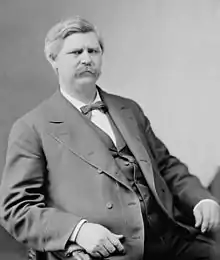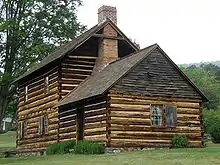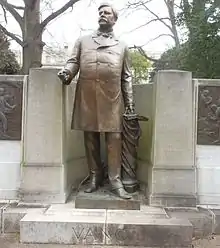Zebulon Baird Vance
Zebulon Baird Vance (May 13, 1830 – April 14, 1894) was a Confederate military officer in the American Civil War, the 37th and 43rd Governor of North Carolina, and U.S. Senator. A prolific writer, Vance became one of the most influential Southern leaders of the Civil War and postbellum periods. As a leader of the "New South", Vance favored the rapid modernization of the Southern economy, railroad expansion, school construction, and reconciliation with the North.[4]
Zebulon Baird Vance | |
|---|---|
 | |
| United States Senator from North Carolina | |
| In office March 4, 1879 – April 14, 1894 | |
| Preceded by | Augustus S. Merrimon |
| Succeeded by | Thomas J. Jarvis |
| 37th and 43rd Governor of North Carolina | |
| In office January 1, 1877 – February 5, 1879 | |
| Lieutenant | Thomas J. Jarvis |
| Preceded by | Curtis H. Brogden |
| Succeeded by | Thomas J. Jarvis |
| In office September 8, 1862 – May 29, 1865 | |
| Preceded by | Henry T. Clark |
| Succeeded by | William W. Holden |
| Member of the U.S. House of Representatives from North Carolina's 8th district | |
| In office December 7, 1858 – March 3, 1861 | |
| Preceded by | Thomas L. Clingman |
| Succeeded by | Robert B. Vance |
| Personal details | |
| Born | May 13, 1830 Weaverville, North Carolina |
| Died | April 14, 1894 (aged 63) Washington, D.C. |
| Political party | Whig/American (pre-Civil War)[1] Conservative Party of NC (c. 1862–1872)[2][3] Democratic (1872–1894) |
| Spouse(s) | Harriette Vance |
| Children | 4 |
| Education | Washington College Academy University of North Carolina at Chapel Hill |
| Profession | Lawyer, Colonel, Politician |
Childhood
Zebulon Vance was born in Buncombe County, North Carolina, near present-day Weaverville,[5] the third of eight children. His wealthy family owned 18 slaves.[6] His uncle was Congressman Robert Brank Vance, for whom his elder brother, Robert B. Vance, was named. At age twelve he was sent to study at Washington College in Tennessee, now known as Washington College Academy. The death of his father forced Vance to withdraw and return home at the age of fourteen. It was during this time that he began to court Harriette Espy by letter.[7]

To improve his standing, Vance determined to go to law school. At the age of twenty-one, he wrote to the President of the University of North Carolina, where he was a member of the Dialectic and Philanthropic Societies and Phi Gamma Delta fraternity, former Governor David L. Swain, and asked for a loan so that he could attend law school. Governor Swain arranged for a $300 loan from the university, and Vance performed admirably. By 1852 Vance began practicing law in Asheville, and was soon elected county solicitor (prosecuting attorney). By 1853, he married Harriette Espy at Quaker Meadows.[8] They had five sons, four of whom survived to adulthood.
Civil War
_(14759502121).jpg.webp)
By the time the ordinance of secession had passed in May 1861, Vance was a captain stationed in Raleigh, commanding a company known as the "Rough and Ready Guards", part of the Fourteenth North Carolina Regiment. That August, Vance was elected Colonel of the Twenty-sixth North Carolina. The Twenty-sixth engaged in the Battle of New Bern in March 1862, where Vance conducted an orderly retreat. Vance also led the Twenty-sixth at Richmond. The Twenty-sixth was ultimately destroyed at the Battle of Gettysburg, losing more than 700 of its original 800 members, though Vance at that time was no longer in military service.
In September 1862, Vance easily won the gubernatorial election under the banner of the Conservative Party, a coalition of former Whigs (such as Vance) and Democrats with Unionist sympathies, over secessionist Democrat William J. Johnston of Charlotte.[9] In the Confederacy Vance was a major proponent of individual rights and local self-government, often putting him at odds with the Confederate government of Jefferson Davis. For example, North Carolina was the only state to observe the right of habeas corpus and keep its courts fully functional during the war. Vance opposed Confederate conscription practices; postwar, he would even testify in the hearing investigating George Pickett's execution of 22 alleged Confederate deserters in the aftermath of the Battle of New Bern (1864). Vance testified that the North Carolinians were "troops raised for local defense" and that "the Confederate government did not keep faith with these local troops," who were "transfer[red] to the regular service" in "violation of their enlistment agreement."[10] This testimony questioned the legality of Pickett's decision to hang as deserters the North Carolinians found fighting for the Union troops, and put Pickett at risk of prosecution for war crimes. Vance also refused to allow supplies smuggled into North Carolina by blockade runners to be given to other states until North Carolinians had their share. Vance's work for the aid and morale of the people inspired the nickname "War Governor of the South". Vance was re-elected in 1864, defeating former supporter, Unionist Democrat, and now peace candidate William Woods Holden. On May 29, 1865, Holden was appointed governor by President Andrew Johnson.[11] Some have said that when Vance left Raleigh when it was captured by Sherman at the end of the Civil War, that the house where he temporarily lived in Statesville was a "temporary state capitol", but it is more accurately argued that there is no evidence that he conducted official business in Statesville, and that Gov. Holden believed that once Vance left Raleigh, he relinquished the office of governor.[12][13]
Post-war career
Governor Vance was arrested by Federal forces on his birthday in May 1865 and spent time in prison in Washington, D.C. Per US President Andrew Johnson's amnesty program, he filed an application for pardon on June 3, and was paroled on July 6.[14] After his parole, he began practicing law in Charlotte, North Carolina. Among his clients was accused murderer Tom Dula, the subject of the folk song "Tom Dooley". Governor Vance was formally pardoned on March 11, 1867, though no formal charges had ever been filed against him before his arrest, during his imprisonment, nor during the period of his parole.[14]
In 1870, the state legislature elected him to the United States Senate, but due to the restrictions placed on ex-Confederates by the 14th Amendment , he was not allowed to serve. In 1876, Vance was elected Governor once again (during which time he focused on education), and in 1879 the legislature again elected him to the United States Senate. This time he was seated, and he served in the Senate until his death in 1894. In the Senate, he opposed McKinley tariff, civil service programs, and repeal of the Sherman Silver Purchase Act. He generally supported conservative President Grover Cleveland, and back in North Carolina fought the populists and Farmers Alliance.[15]
Starting in about 1870, Vance gave a speech hundreds of times he called "The Scattered Nation", praising Jews and calling for religious tolerance and freedom amongst all Americans.
Personal life
In 1880, Vance married Florence Steele Martin of Kentucky.[16][17]
After a funeral in the U.S. Capitol, Vance was buried in the Riverside Cemetery in Asheville.[14] In his eulogy former Governor T. J. Jarvis said:
- He was the Mount Mitchell of all our great men, and in the affections and love of the people, he towered above them all. As ages to come will not be able to mar the grandeur and greatness of Mount Mitchell, so they will not be able to efface from the hearts and minds of the people the name of their beloved Vance.[18]
His biographer, historian Selig Adler wrote:
- As war governor, Vance endeared himself forever to his people. He mitigated the horrors of war by insisting on the precedence of civil law, and stoutly protected the state from the uncomfortable militarism of the Confederate government.[19]
Legacy
There are several monuments dedicated to Vance:


- A 75-foot obelisk is dedicated to Vance in Pack Square Park, Asheville.
- Vance House and Museum on West Front Street in Statesville, North Carolina, a home to which Vance fled after Sherman captured Raleigh.[20]
- A statue on the south grounds of the North Carolina State Capitol in Raleigh
- A bronze in the National Statuary Hall Collection in Washington, D.C.
- A small monument located where his post-war home once stood (1865–1894), at Sixth and College Streets, in Charlotte
- One of the administrative buildings at the University of North Carolina at Chapel Hill is named Vance Hall in his honor.
- A portrait of Vance hangs in the Dialectic Chamber of the Dialectic and Philanthropic Societies of the University of North Carolina at Chapel Hill.
- A stained glass window at Salem College in their history wing was erected in memoriam of Senator Vance in 1896
- His birthplace is a state historic site in Weaverville.[21]
Several locations and schools in North Carolina bear Vance's name:
- The town of Zebulon, in Wake County
- The town of Vanceboro, in Craven County
- Vance County, NC
- Zebulon B. Vance High School in Charlotte
- Zeb Vance Elementary School in Kittrell
- Vance Masonic Lodge A.F.&A.M. #293 in Weaverville
- Vance Gap Road in Asheville
In World War II, the United States liberty ship SS Zebulon B. Vance was named in his honor.[22]
See also
Notes
- Holden, W. W. (1911). Memoirs of W. W. Holden. Durham, NC: The Seeman Printery. p. 19.
- 1862 Gubernatorial election. Ourcampaigns.com (January 21, 2005). Retrieved on 2012-04-03.
- 1872 U.S. Senate election. Ourcampaigns.com (December 26, 2006). Retrieved on 2012-04-03.
- Leonard C. Schlup, and James Gilbert Ryan, eds. Historical dictionary of the Gilded Age (2003) p 511.
- Vance Birthplace, official website Archived December 9, 2003, at the Wayback Machine. Ah.dcr.state.nc.us. Retrieved on April 3, 2012.
- David Vance, Sr. will of 1813. See also, 1810 Census for Buncombe County, NC.
- University of North Carolina, Zebulon Baird Vance, edited from the DICTIONARY OF NORTH CAROLINA BIOGRAPHY. Docsouth.unc.edu. Retrieved on April 3, 2012.
- Survey and Planning Unit (August 1973). "Quaker Meadows" (PDF). National Register of Historic Places - Nomination and Inventory. North Carolina State Historic Preservation Office. Retrieved August 1, 2014.
- Faulkner, Ronnie W. "Conservative Party". NCPedia. North Carolina Government & Heritage Library at the State Library of North Carolina. Retrieved November 13, 2020.
- Current, Richard Nelson (1992). Lincoln's Loyalists: Union soldiers from the Confederacy. Lawrenceville, New Jersey: Princeton University Press. p. 122. ISBN 978-1-55553-124-9.
- Presidential Proclamation No. 38, May 29, 1865, 13 Stat. 760
- http://michaelchardy.blogspot.com/2015/05/statesville-last-north-carolina-state.html
- http://www.statesville.com/news/museum-holding-civil-war-living-history-day/article_ec7381a8-c133-11e3-aca6-0017a43b2370.html
- Zebulon Baird Vance, 13 May 1830-14 Apr. 1894. Docsouth.unc.edu. Retrieved on April 3, 2012.
- Leonard C. Schlup, and James Gilbert Ryan, eds. Historical dictionary of the Gilded Age (2003) p 511.
- Rasmussen, Steve. Mountain Xpress – Asheville's Monument to Tolerance, May 7, 2003. Mountainx.com. Retrieved on April 3, 2012.
- University of North Carolina – Asheville, Ramsey Library, Special Collections Archived September 27, 2007, at the Wayback Machine. Toto.lib.unca.edu (January 5, 2007). Retrieved on 2012-04-03.
- United States. Congress (1895). Memorial Addresses on the Life and Character of Zebulon Baird Vance: (late a Senator from North Carolina) Delivered in the Senate and House of Representatives, Fifty-third Congress, Third Session. U.S. Government Printing Office. p. 86.
- Selig Adler, Zebulon B. Vance and the 'Scattered Nation'" Journal of Southern History (1941) 7#3 pp. 357-377 Online.
- "Vance House, Marker-25". Retrieved February 14, 2019.
- Cultural Resources, North Carolina Department of (January 11, 2010), NC Historic Sites – Vance Birthplace, retrieved February 14, 2010
- Warren, Harry. "Zebulon B. Vance, USS -- NCPedia". Retrieved December 27, 2017.
Further reading
- Adler, Selig. "Zebulon B. Vance and the 'Scattered Nation'" Journal of Southern History (1941) 7#3 pp. 357-377 Online
- Clement Dowd, Life of Zebulon B. Vance (Charlotte, N. C., 1897), outdated
- Gordon McKinney, Zeb Vance : North Carolina's Civil War Governor and Gilded Age Political Leader (Chapel Hill, N. C., 2004), standard scholarly biography
- Sharyn McCrumb, "Ghost Riders" (Signet, May 4, 2004). This novel includes a fictionalized account of Vance's life told in first person.
- Yates, Richard E. "Zebulon B. Vance: as War Governor of North Carolina, 1862‑1865", Journal of Southern History (1937) 3#1 pp 43‑75 online
- Chisholm, Hugh, ed. (1911). . Encyclopædia Britannica. 27 (11th ed.). Cambridge University Press., Includes text incorporated in this article.
External links
- Works by or about Zebulon Baird Vance at Internet Archive
- Vance Birthplace
- North Carolina State Library Biography
- Congressional Biography
- Learn NC
| Party political offices | ||
|---|---|---|
| Preceded by Augustus Summerfield Merrimon |
Democratic nominee for Governor of North Carolina 1876 |
Succeeded by Thomas Jordan Jarvis |
| U.S. House of Representatives | ||
| Preceded by Thomas L. Clingman |
Member of the U.S. House of Representatives from North Carolina's 8th congressional district 1858–1861 |
Succeeded by Civil War |
| Political offices | ||
| Preceded by Henry T. Clark |
Governor of North Carolina 1862–1865 |
Succeeded by William W. Holden |
| Preceded by Curtis H. Brogden |
Governor of North Carolina 1877–1879 |
Succeeded by Thomas J. Jarvis |
| U.S. Senate | ||
| Preceded by Augustus S. Merrimon |
U.S. senator (Class 3) from North Carolina 1879–1894 Served alongside: Matt W. Ransom |
Succeeded by Thomas J. Jarvis |

